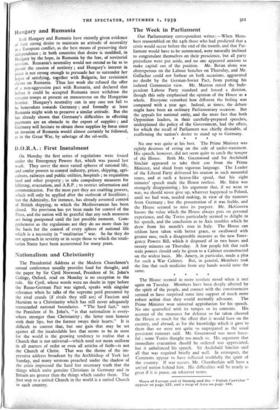Nationalism and Christianity
The Presidential Address at the Modern Churchmen's annual conference usually provides food for thought, and the paper by Sir Cyril Norwood, President of St. John's College, Oxford, read on Monday is no exception to the rule. Sir Cyril, whose words were no doubt in type before the Russo-German Pact was signed, speaks with singular relevance when he talks of the supreme peril presented by the rival creeds (if rivals they still are) of Fascism and Marxism to a Christianity which has still never adequately transcended national boundaries. "The hard fact," says the President of St. John's, " is that nationalism is every- where stronger than Christianity ; the latter men honour with their lips, but the former sways their hearts." It is difficult to contest that, but one gain that may be set against all the incalculable loss that seems to be in store for the world is the growing tendency to realise that a Church that is not universal—which need not mean uniform in all matters of order or even all articles of faith—is not the Church of Christ. That was the theme of the im- pressive address broadcast by the Archbishop of York last Sunday, and many sermons preached under the shadow of the crisis impressed the hard but necessary truth that the things which unite genuine Christians in Germany and in Britain are greater than the things which sunder them. The .first step to a united Church in the world is a united Church in each country.


































 Previous page
Previous page